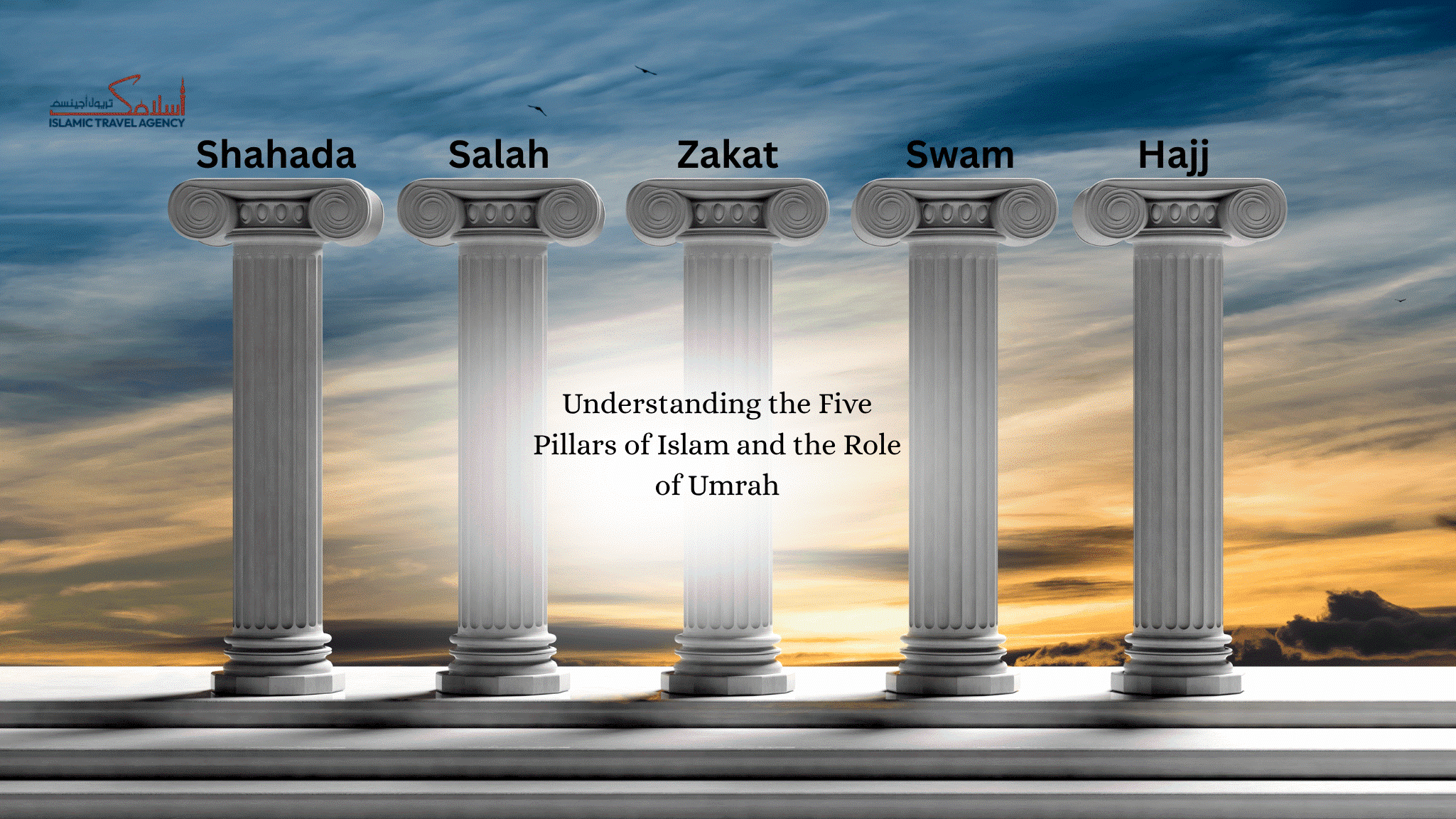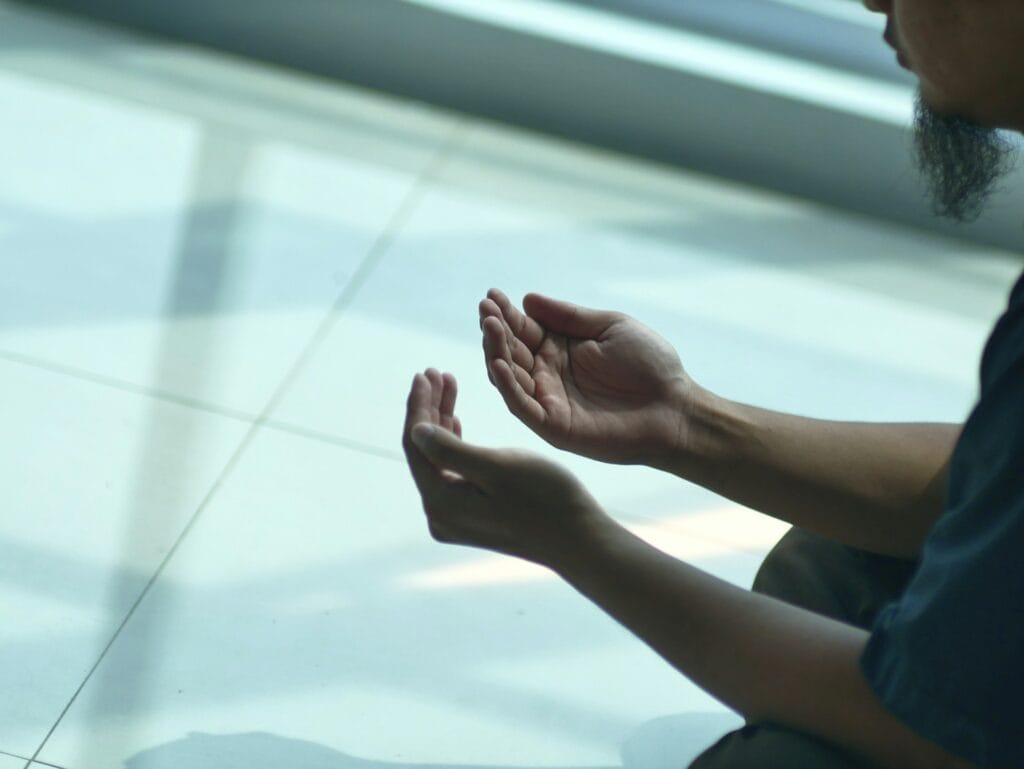
Shahada, Salah, Zakat, Sawm, and Hajj are the five pillars of Islam. Umrah is a smaller journey to the holy cities of Mecca and Madinah. It is not obligatory, but packed with divine blessings and wonderful rewards. Though Umrah isn’t among the five pillars of Islam, it represents all of them. It is a beloved Sunnah of the holy Prophet, PBUH, with unmatched benefits, especially when performed in Ramadan. Performing Umrah in view of these pillars of Islam can enhance the spiritual richness and rewards.
Islamic Travel Agency is offering Umrah Packages to British Muslims, including everything they need on their path to perform Umrah. Our expert Umrah specialist ensures thorough support and assistance to pilgrims at every step of their journey.
Let’s explore the significance of these Islamic pillars on the Umrah experience:
Introduction to the Five Pillars of Islam
Faith and Muslim custom rely on Islam’s five pillars. These pillars include Shahada, Salah, Zakat, Sawm, and Hajj, and help Muslims at all stages of life. Every pillar of Islam embodies a certain form of meditation and prayer that fits the significance of divinity with the purpose of life. Understanding of these pillars facilitates the investigation of the beauty and equilibrium of divinity. They instruct us on the virtues of humility, closeness, peace, and love. The trip gets more deliberate and enriched when we conduct Umrah, staying in touch with these pillars.
How does Umrah enhance the significance of these pillars?
Umrah is a spiritually enhanced pilgrimage supplementing the beauty of the five pillars of Islam. Though Umrah isn’t an authorized part of these pillars, it is the most favorite Sunnah of the Prophet PBUH and shares many rituals with Hajj, such as Ihram, Tawaf, Sa’i, and Halaq. The journey offers a golden chance to renew your soul, energize your faith, and reconnect with Allah SWT. From reciting Shahada to performing Hajj, each pillar reinforces devotion and commitment. Umrah is a time when the five pillars of Islam are not just understood but are lived at each step. Islamic Travel Agency provides complete guidance for Umrah to Pilgrims.
Shahada to strengthen faith
This is the first pillar of Islam, announcing that:
“There is no power but Allah, and the Prophet PBUH is His messenger.”
The heart of Islam, source of devotion, Shahada, is what Muslims experiencing Umrah feel its great force as they stand before the Kaaba, conduct Tawaf, and worship. Reciting the Shahada at Umrah provides a time of clarity, faith, surrender, and obedience. Linking the pilgrims with devotion and commitment to Allah signals the start of every act of worship anew.
Salah during pilgrimage

Salah is a part of the daily routine of every Muslim. During Umrah, the prayers take on a very crucial necessity. Offering Salah in Masjid al-Nabawi and Masjid Al-Haram is a lifelong dream of many Muslims. The sacred sites in Mecca and Madinah offer a calm atmosphere with an overwhelming unity and strong connections. Performing prayer with lots of fellow pilgrims teaches us discipline, thankfulness, and devotion. Salah is like an open conversation with Allah SWT, repeating to us that no matter where you are, Allah is always near and listening.
Zakat: the spirit of charity
Zakat, the third pillar of Islam, revolves around the themes of caring, division, and inspiring fellow Muslims. Umrah brings the spirit of charity. Pilgrims donate, upkeep others, and make the trip easy for fellow pilgrims. Whether you are involved in a small act of contributing or buying meals for somebody, each act of kindness matters. Charity brings double rewards in the holy month of Ramadan. It generates the atmosphere of brotherhood and unity.
Swam fasting and its spiritual impact
Fasting is the most significant pillar of Islam that teaches us the lessons of patience, self-control, and focus. Mostly pilgrims try to book their packages during Ramadan to enjoy its enriched rewards, as in the words of Hazrat Muhammad PBUH:
“Umrah is Ramadan is equal to Hajj…”
If you are booking your travel during Ramadan, you can opt for Ramadan Umrah packages to begin with ease and convenience. Fasting in the peaceful and spiritually filled atmosphere calms your heart and brings peace. It helps to leave the worldly interruptions behind and focus on the spiritual aspects of Umrah while reconnecting your soul with the divinity. Fasting/ Swam isn’t just about restraining yourself from food and other prohibited actions; it is a journey towards a nourished soul.
Hajj and Umrah: understanding the difference
Though they are both pilgrimages, Hajj and Umrah have distinct rituals and commitment levels. Once in a lifetime, for those who are able, Hajj is required during particular days of Dhul Hijjah. In opposition, Umrah is optional and can be carried out anytime, year-round. Umrah is centered on Tawaf and Sa’i, even though Hajj has standing at Arafat and stoning the Jamarat. Though they differ in this regard, both trips provide great spiritual benefits. For many, Umrah marks a sincere beginning to the greater road of pilgrimage, a stepping stone.
The spiritual benefits of applying these pillars during Umrah
Living the Five Pillars transforms the journey into an absolute act of worship. Every pillar—Shahada, prayer, Zakat, fasting, and Hajj—comes alive in the sacred environs of Makkah and Madinah. The encounter is very intimate, passionate, and enveloping. Often, pilgrims return with closer ties to Allah, a newly clear resolve, and a freshly accepting attitude. By adhering to these principles during Umrah, you enable emotional development, heart cleansing, and the embracing of Islam’s core. It’s about change, not only rituals. Every step, prayer, and kindness you show creates a legacy of devotion. And Islamic Travel Agency is honored to walk beside you on this sacred path with its cheapest Umrah packages.